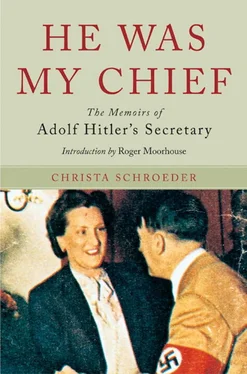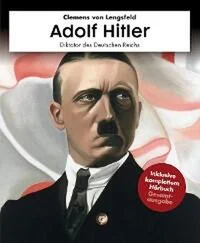Christa Schroeder - He Was My Chief - The Memoirs of Adolf Hitler's Secretary
Здесь есть возможность читать онлайн «Christa Schroeder - He Was My Chief - The Memoirs of Adolf Hitler's Secretary» весь текст электронной книги совершенно бесплатно (целиком полную версию без сокращений). В некоторых случаях можно слушать аудио, скачать через торрент в формате fb2 и присутствует краткое содержание. Город: Barnsley, Год выпуска: 2012, ISBN: 2012, Издательство: Frontline Books, Жанр: История, Биографии и Мемуары, на английском языке. Описание произведения, (предисловие) а так же отзывы посетителей доступны на портале библиотеки ЛибКат.
- Название:He Was My Chief: The Memoirs of Adolf Hitler's Secretary
- Автор:
- Издательство:Frontline Books
- Жанр:
- Год:2012
- Город:Barnsley
- ISBN:978-1-7830-3064-4
- Рейтинг книги:4 / 5. Голосов: 1
-
Избранное:Добавить в избранное
- Отзывы:
-
Ваша оценка:
- 80
- 1
- 2
- 3
- 4
- 5
He Was My Chief: The Memoirs of Adolf Hitler's Secretary: краткое содержание, описание и аннотация
Предлагаем к чтению аннотацию, описание, краткое содержание или предисловие (зависит от того, что написал сам автор книги «He Was My Chief: The Memoirs of Adolf Hitler's Secretary»). Если вы не нашли необходимую информацию о книге — напишите в комментариях, мы постараемся отыскать её.
He Was My Chief: The Memoirs of Adolf Hitler's Secretary — читать онлайн бесплатно полную книгу (весь текст) целиком
Ниже представлен текст книги, разбитый по страницам. Система сохранения места последней прочитанной страницы, позволяет с удобством читать онлайн бесплатно книгу «He Was My Chief: The Memoirs of Adolf Hitler's Secretary», без необходимости каждый раз заново искать на чём Вы остановились. Поставьте закладку, и сможете в любой момент перейти на страницу, на которой закончили чтение.
Интервал:
Закладка:
Chapter 16
The End at the Berghof
UPON OUR ARRIVAL AT the Berghof we found some guests already there. Eva Braun’s sister was very pregnant. Their mother, Frau Franziska Braun, and Herta Schneider, Eva’s long-term friend, were also present. They had no idea of the catastrophic situation in Berlin and asked when the Führer would be coming down. They saw us as the vanguard, for besides Hitler’s naval adjutant Jesko von Puttkamer some of the SS-Begleitkommando had moved into quarters at the Berghof, proof that Hitler had at least given some thought to coming to the alpine redoubt.
There were frequent air raid alarms, when Obersalzberg would be hidden under a smoke screen. The enemy aircraft passed overhead without bombing. Two days later, on 24 April 1945, Hitler’s personal physician Dr Morell arrived. He was very distressed and bitter: the Führer distrusted him, he said, and had sent him packing. It had hit him hard. After a short stay he took his leave saying he was going to Bad Reichenhall. Even Frau Kannenberg turned up in order to join her husband at Thumsee.
Here I must mention something about Dr Morell. Dr Karl Brandt was often incorrectly described as the Führer’s personal physician. Dr Brandt and the deputies he had suggested, Dr Haase and Dr von Hasselbach, were only Begleitärzte , that is, they were available to perform emergency surgery on Hitler if so required during his travels. The personal physician ( Leibarzt ) was Dr Theodor Morell. Dr Morell had a luxury practice on the Kurfürstendamm in Berlin, most of his patients being from the artistic world. He originated from Hesse, was of average height, corpulent and wore a good-humoured expression. Hair sprouted from his ears and cuffs. On his thick fingers he wore exotic rings obtained during overseas voyages, on which he had also picked up some foreign eating habits. For example he would not peel an orange but bite into it until the juice squirted out. He was also vain. If a photographer reached for his camera, Morell was suddenly at Hitler’s side. The Foreign Ministry Protocol Section, which was responsible for the award of foreign decorations, rightly feared that Morell was wearing medals to which he was not entitled, and this could compromise Hitler. Moreover, Morell was said to be a profiteer. Another quite special objection to him was the foul-smelling delousing powder he had patented and which he spread in large quantities around his barrack hut at FHQ.
How had he been appointed Hitler’s personal physician? In 1936 when Hitler’s chronic gastro-intestinal disorder would not respond to treatment, Heinrich Hoffmann had recommended a wonderful doctor of his personal knowledge, and he succeeded in overwhelming Hitler’s aversion to having an unknown physician treat him. When Dr Morell brought about a decisive improvement in the complaint with the Mutaflor drug (used nowadays for ulcerative colitis), and which renewed the colonic bacteria, and also rid Hitler of the eczema on his legs, Morell won Hitler’s total confidence. Hitler named him his Leibarzt and later made him a professor.
As soon as Hitler reported any discomfort, Morell would be on the spot with his injections. Any cold, even amongst Hitler’s close staff, was suppressed before it developed. Hitler had ‘no time to be ill’ he repeated over and over, and Morell based his treatment on that dictum. He began with harmless glucose, vitamin and hormone injections. Then he went over to ‘Vitamultin’, a wonder-drug he had produced in his own pharmaceutical laboratory, available in ampoules and gold-wrapped tablet form. Hitler became increasingly dependent on this drug until one day it no longer had the desired effect and Morell had to look for something stronger. My assumption seems confirmed by an article appearing in edition 7/1980 of Spiegel magazine under the title Hitler◦– An der Nadel . This was based on the book by Leonard L. and Renate Heston, The Medical Casebook of Hitler , which concerned itself with the same question. Morell’s files were made available to the US psychiatrists and the drug ‘Vitamultin’, containing the stimulants pervitin and caffeine, was described as ‘an especially effective preparation because caffeine enhances the effect of pervitin’.
In the autumn of 1944 when Dara and I took tea alone with Hitler, we found him in a strikingly relaxed mood. The waiter had placed his painful leg on the sofa for him, and now he was stretched out comfortably. During a murmured conversation he suddenly threw open his arms and spoke ecstatically of ‘how lovely it is when two people find themselves in love’. Dara and I were astonished, for we had never seen this mood before, Hitler given so mysteriously to the joys of love.
Afterwards we sought out Dr Morell in his hut and asked why the boss was behaving so strangely. Morell looked at us over his glasses with a sly smile: ‘So you’ve noticed? Yes, I am giving him hormone injections from bulls’ testicles, that should pep him up!’ In March 1980, Robert Scholz, who had worked on Rosenberg’s staff, told me that Morell had asked Rosenberg to get him some bulls’ testicles.
That Hitler was dependent on stimulants prescribed by Morell is proven by several reports. After the attempt of 20 July 1944, Dr Erwin Giesing, who had been called in to treat Hitler’s damaged ear drum, made it known that Morell was treating Hitler with ill-considered medications. One morning Dr Giesing discovered on Hitler’s breakfast tray a small bottle of anti-flatulence pills containing two powerful poisons. When he asked the servant Linge how many the Führer took daily, he was told ‘Up to sixteen’. Appalled at Morell’s negligence, he had Dr Brandt, who as head of the Health Department was no longer constantly at FHQ, come at once to Wolfsschanze. Dr Brandt and Dr Hasselbach explained to Hitler that the trembling of his left hand and gradual loss of vision were the result of the poisons in the anti-flatulence pills and that it was irresponsible of Dr Morell to have made them freely available to be eaten like sweets. [137] In her notes, Schroeder recorded: ‘In the autumn of 1944 the boss took “anti-flatulence tablets” containing two strong poisons including belladonna. I remember Dr Giesing saying that all the health problems Hitler suffered came from taking these poisons on a regular basis. Hitler complained about his serious loss of vision… I remember how often he used to scratch himself.’
Hitler would hear no evil spoken against Dr Morell, upon whom he was now so dependent that he ignored the advice of Brandt and Hasselbach. Hitler thought that their only intention was to get rid of Morell and, since they knew that he, Hitler, could not live without Morell, they must be aiming indirectly to get rid of him too.
The extent to which he believed this became clear to me at a luncheon at the Reich Chancellery in March 1945. From now on Hitler did not want Brandt and Hasselbach at FHQ. His distrust of Dr Brandt grew when he heard reports allegedly made by Brandt as to the hopelessness of the war. The fact that Dr Brandt had sent his wife Anni from Berlin to Liebenzell, and not to the Berghof, a day before the Americans arrived at Liebenzell, earned him the death sentence.
On 16 March 1945 Johanna Wolf and I were scheduled to provide Hitler with company at the table for lunch. As always the table was carefully laid, the lamp standard switched on and the curtains drawn, hiding the ruins of the Hotel Kaiserhof and the Propaganda Ministry. We sat waiting in the Staircase Room far longer than usual. Finally, probably around 0230, the servant Linge opened the door and announced: ‘The chief is coming.’ Hitler followed him in with a worried frown, kissed our hands absent-mindedly and gave vent to his anger as soon as we had sat down:
Читать дальшеИнтервал:
Закладка:
Похожие книги на «He Was My Chief: The Memoirs of Adolf Hitler's Secretary»
Представляем Вашему вниманию похожие книги на «He Was My Chief: The Memoirs of Adolf Hitler's Secretary» списком для выбора. Мы отобрали схожую по названию и смыслу литературу в надежде предоставить читателям больше вариантов отыскать новые, интересные, ещё непрочитанные произведения.
Обсуждение, отзывы о книге «He Was My Chief: The Memoirs of Adolf Hitler's Secretary» и просто собственные мнения читателей. Оставьте ваши комментарии, напишите, что Вы думаете о произведении, его смысле или главных героях. Укажите что конкретно понравилось, а что нет, и почему Вы так считаете.












